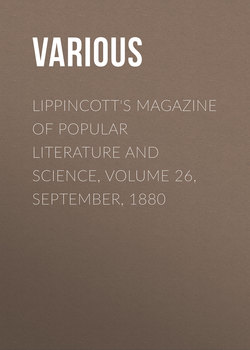Lippincott's Magazine of Popular Literature and Science, Volume 26, September, 1880

Реклама. ООО «ЛитРес», ИНН: 7719571260.
Отрывок из книги
Itasca Lake was first seen of white men by William Morrison, an old trader, in 1804. Several expeditions attempted to find the source of the Great River, but the region was not explored till 1832—by Schoolcraft, who regarded himself as the discoverer of Itasca. Much interesting matter concerning the lake and its vicinity has been written by Schoolcraft, Beltrami and Nicollet, but the exceeding difficulty of reaching it, and the absence of any other inducements thither than a spirit of adventure and curiosity, make visitors to its solitudes few and far between. Itasca is fed in all by six small streams, each too insignificant to be called the river's source. It has three arms—one to the south-east, about three and a half miles long, fed by a small brook of clear and lively water; one to the south-west, about two miles and a half long, fed by the five small streams already described; and one reaching northward to the outlet, about two and a half miles. These unite in a central portion about one mile square. The arms are from one-fourth of a mile to one mile wide, and the lake's extreme length is about seven miles. Its water is clear and warm. July thirteenth, when the temperature of the air was 76°, the water in the largest arm of the lake varied between 74° and 80°. We saw no springs nor evidences of them, and the water's temperature indicates that it receives nothing from below. Still, it is sweet and pure to the taste and bright and sparkling to the eye. Careful soundings gave a depth varying between fourteen and a half and twenty-six feet. The only island is that named by Schoolcraft after himself in 1832. It is in the central body of the lake, and commands a partial view of each arm. It is about one hundred and fifty feet wide by three hundred feet long, varying in height from its water-line to twenty-five feet, and is thickly timbered with maple, elm, oak and a thicket of bushes.
On Tuesday morning, July 14, at six o'clock, we paddled away from the island to the foot of the lake. The outlet is entirely obscured by reeds and wild rice, through which the water converges in almost imperceptible current toward the river's first definite banks. This screen penetrated, I stopped the Kleiner Fritz in mid-stream and accurately measured width, depth and current. I found the width twenty feet, the depth on either side of my canoe as she pointed down the stream thirty-one inches, and the speed of the current two and one-tenth miles to the hour. The first four miles of the infant's course is swift and crooked, over a bed of red sand and gravel, thickly interspersed with mussel and other small shells, and bordered with reeds. Through these, at two points, we beat our way on foot, dragging the canoes through unmade channels. Indeed, nearly all of these first four miles demanded frequent leaps from the boats to direct their swift and crooked course, until we came to a stretch of savanna country, through which the river washes its way in serpentine windings for nine miles with a gentle current from thirty to sixty feet wide, bordered by high grass, bearing the appearance and having the even depth of a canal. An easy, monotonous paddle through these broad meadows brought us to the head of the first rapids, the scene of our two days' upward struggle. These rapids extend about twelve miles as the river runs, alternating between rattling, rocky plunges and swift, smooth water, for the most part through a densely-wooded ravine cleft through low but abrupt hills, and as lonely and cheerless as the heart of Africa. The solitude is of that sort which takes hold upon the very soul and weaves about it hues of the sombrest cast. From our parting with the Indians on first reaching the river we had neither seen nor heard a human being, nor were there save here and there remote traces of man's hand. No men dwell there: nothing invites men there. A few birds and fewer animals hold absolute dominion. Wandering there, one's senses become intensely alert. But for the hoot of the owl, the caw of the crow, the scream of the eagle, the infrequent twitter of small birds, the mighty but subdued roar of insects, the rush of water over the rocks and the sigh and sough of the wind among the pines, the lonely wanderer has no sign of aught but the rank and dank vegetation and a gloomy, oppressive plodding on and on, without an instant's relief in the sights and sounds of human life. We entered upon the descent of the rapids in no very cheerful mood.
.....
"All safe," said Adam, releasing her while he strained Eve closer to his heart. "We're all back safe and sound, and, saving Tom Braddon and Israel Rickard, without a scratch 'pon any of us."
"Thank God!" sighed Eve, while Joan, verily jumping for joy, cried, "But where be they to, eh, Adam? I must rin, wherever 'tis, and see 'em, and make sure of it with my awn eyes."
.....